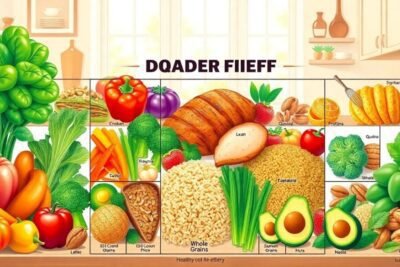
Diabetes friendly diet: your guide to healthy eating
Maintaining a diabetes friendly diet is crucial for managing diabetes effectively. This eating plan focuses on nutrient-dense foods that can help control blood sugar levels and promote overall health. By understanding what to eat and what to avoid, individuals can significantly improve their well-being.
In this article, we will explore various aspects of a diabetes friendly diet, including meal planning, foods to avoid, and the importance of physical activity. Let's delve into how a balanced diet can make a difference in managing diabetes.
- Eating well & managing diabetes
- What is a diabetes friendly diet?
- How can I plan what to eat or drink when I have diabetes?
- What foods must a diabetic avoid?
- What are the best things to eat if you are diabetic?
- Why is meal planning important for diabetes management?
- How can physical activity help manage my diabetes?
- Related Questions About Diabetes Friendly Diet
Eating well & managing diabetes
A diabetes friendly diet not only helps in blood sugar management but also supports overall health. This diet incorporates a variety of food groups to ensure that individuals receive essential nutrients while controlling their carbohydrate intake.
Key components of this diet include:
- Whole grains that are high in fiber
- Lean proteins to maintain muscle mass
- Non-starchy vegetables for essential vitamins and minerals
- Healthy fats to support heart health
Incorporating these elements into daily meals can lead to better blood sugar control and improve overall well-being. Remember, portion control is key, and understanding how different foods affect blood sugar levels is essential.
What is a diabetes friendly diet?
A diabetes friendly diet is designed to help individuals with diabetes manage their condition through balanced nutrition. This diet emphasizes foods that are low on the glycemic index, meaning they have a slower impact on blood sugar levels.
Common features of this diet include:
- Increased intake of fiber-rich foods, such as fruits and vegetables.
- Limiting refined carbohydrates and sugars.
- Incorporation of healthy fats, like those from avocados and nuts.
By focusing on nutrient-rich foods, this diet can aid in weight management and reduce the risk of cardiovascular diseases, which are prevalent among individuals with diabetes.
How can I plan what to eat or drink when I have diabetes?
Planning meals is a vital aspect of managing diabetes effectively. A personalized approach ensures that you meet your nutritional needs while keeping blood sugar levels stable. Here are some tips for planning your meals:
- Use a Diabetes Plate model, dividing your plate into sections for vegetables, proteins, and grains.
- Incorporate a variety of food colors to ensure you are getting different nutrients.
- Consider using a food diary to track what you eat and how it affects your blood sugar.
Always consult with a healthcare provider or dietitian to develop a tailored meal plan. This collaboration can help you understand your specific dietary needs and adjust as necessary.
What foods must a diabetic avoid?
For effective diabetes management, it’s essential to be aware of foods that can negatively impact blood sugar levels. Here are some foods to limit or avoid:
- Refined sugars found in sweets, sodas, and desserts.
- Processed foods high in trans fats and sodium.
- White bread and pasta, which are made from refined flour.
Avoiding these foods helps stabilize blood sugar levels and reduces the risk of complications associated with diabetes.
What are the best things to eat if you are diabetic?
The best foods for individuals with diabetes are those that offer nutritional benefits without spiking blood sugar levels. These include:
- Whole grains like quinoa, brown rice, and oatmeal.
- Lean proteins such as chicken, turkey, and legumes.
- Non-starchy vegetables like broccoli, spinach, and peppers.
Integrating these foods into your daily meals can enhance your overall health and improve blood sugar management.
Why is meal planning important for diabetes management?
Meal planning plays a crucial role in managing diabetes effectively. It helps individuals control their carbohydrate intake and avoid impulsive eating that may lead to unhealthy choices.
Key benefits of meal planning include:
- Better blood sugar control through consistent meal timing and portion sizes.
- Enhanced awareness of food choices and nutritional values.
- Reduced stress associated with last-minute meal decisions.
By taking the time to plan meals, individuals can create a sustainable eating pattern that supports their health and diabetes management.
How can physical activity help manage my diabetes?
Engaging in regular physical activity is another essential component of diabetes management. Exercise helps lower blood sugar levels and improve insulin sensitivity.
Some benefits of physical activity include:
- Weight loss or maintenance, which can help in blood sugar regulation.
- Improved cardiovascular health and reduced risk of heart disease.
- Enhanced mood and overall well-being.
Incorporating a mix of aerobic and resistance training exercises into your routine can provide significant health benefits and help in managing diabetes effectively.
What is the best diet for a diabetic person?
The best diet for a diabetic person is one that is rich in whole foods, low in refined sugars, and focuses on balanced macronutrients. A diabetes friendly diet includes a variety of fruits, vegetables, whole grains, and lean proteins. Additionally, incorporating healthy fats can support heart health, which is crucial for diabetics. Portion control and meal timing also play significant roles in managing blood sugar levels.
What foods must a diabetic avoid?
Diabetics should avoid foods high in refined sugars, processed snacks, and sugary beverages. Foods such as white bread, pastries, and fried foods can lead to spikes in blood sugar and should be limited. It's essential to focus on whole, unprocessed foods to maintain stable blood sugar levels.
What is the best food for diabetics to eat out?
When eating out, diabetics should look for options that include lean proteins, plenty of non-starchy vegetables, and whole grains. Salads with grilled chicken or fish, whole grain wraps, and dishes with quinoa or brown rice are excellent choices. It's important to avoid fried foods and heavy sauces that might contain hidden sugars.
What are the best things to eat if you are diabetic?
The best foods for diabetics include whole grains like brown rice and quinoa, lean proteins such as chicken and beans, and plenty of non-starchy vegetables. Healthy fats from sources such as avocados and nuts are also beneficial. Prioritizing a variety of these foods can help maintain balanced blood sugar levels while providing essential nutrients.










